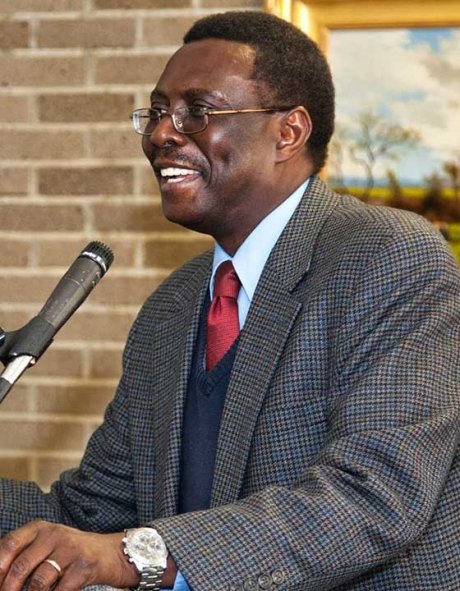“Democracy in Disarray”: Peter Mendy Lectures in South Africa
- News & Events
- News
- “Democracy in Disarray”: Peter Mendy Lectures in South Africa

Professor of History and Africana Studies Peter Mendy discusses why democracy in Africa remains largely elusive.
This spring, the University of South Africa celebrated 20 years of democracy and freedom from apartheid with a lecture series. The university invited RIC Professor of History and Africana Studies Peter Mendy to give the keynote, which he titled “Democracy in Disarray.”
“Pure democracy has not happened anywhere in the world,” said Mendy, not even in the land where Western democracy originated – Athens. In virtually all Western democratic societies throughout ancient and modern history, he said, democratic rights that came with citizenship was only given to an elite class – white, propertied men.
“In the U.S., white men who didn’t have property were not allowed to vote until the 19th century,” he noted. “White women could not vote until the early 20th century. And, of course, black people did not have the vote until the 1960s.”
Mendy also noted that the right to vote is only one aspect of democracy. Ultimately, democracy is about power and empowerment, he said.
The original Greek meaning of the word democracy derives from demos, meaning “the people,” and kratos,meaning “power,” he explained. “Democracy means people’s power or power by the people,” he said.
“In South Africa, the black majority still lack economic power,” he went on. “The economy continues to be largely controlled by 13 percent of the population – the whites – and the overwhelming majority of the population live in dire poverty, some in shacks with no running water. In that sense, South Africa has not changed much since apartheid, and black South Africans are very disenchanted with the situation right now. This is also true of many other independent African countries. The answer is empowerment.”
In his keynote, Mendy gave a critical evaluation of the democratization process in other parts of Africa. While South Africa was holding its first multiracial, multiparty elections, he said, Guinea-Bissau was celebrating its first multiparty elections since their independence. Yet in Guinea-Bissau, as in other parts of post-colonial Africa, democracy remains elusive, he said.
Though the first democratic elections in Guinea-Bissau in 1994 were peaceful, within four years, a civil war broke out between two factions of the military. The politicized military has continuously interferred in politics since the first coup d’etat in 1980, according to Mendy. Since the first democratic elections, no president, parliament or government has ever completed a term in office. Coups d’etat and political assasinations have been frequent and include the killing of a president, a presidential candidate, former ministers and three armed forces chiefs of staff, he said.
“Democratization in Guinea-Bissau, and in many other parts of post-colonial Africa, has been ‘challenged,’” said Mendy. “Guinea-Bissau’s military has refused to stay out of politics. And that is the problem with countries that have been liberated violently. The soldiers who fought for liberation have an entitlement mentality. They feel that since they liberated the country that they must have a say in the running of the country. The problem is also that Africans inherited an authoritarian system from their colonial rulers.”
According to Mendy, authoritarian regimes demand absolute obedience to authority and consist of leaders who maintain control through the unregulated use of political power, control of the armed forces, deprivation of civil liberties and the elimination of potential political challengers.
“This is what Africa inherited and continues to replicate,” said Mendy. “However, internal and external pressure is being placed on African countries to become democratized. Since the end of the Cold War, major donor countries such as the United States and major donor institutions such as the World Bank and the International Monetary Fund have made their developmental assistance conditional on democratization.”
What is the prospect of democracy ever happening?
“Democracy is an ideal that societies aspire to and strive for,” Mendy said, “but whether we will ever reach it is the challenge.”
Professor Peter Mendy was born in Gambia, West Africa, a former British colony. He speaks English, French and Portuguese, along with five African languages. He completed his Ph.D. at the University of Birmingham in England. At RIC he teaches the political history of Africa from colonial rule to independence to contemporary Africa, along with conflict and conflict resolution. He has written numerous publications, including The Historical Dictionary of the Republic of Guinea-Bissau (Scarecrow Press), which he co-authored with Professor Emeritus Richard Lobban, and he is currently researching and writing a book on democracy and democratization in Guinea-Bissau.
